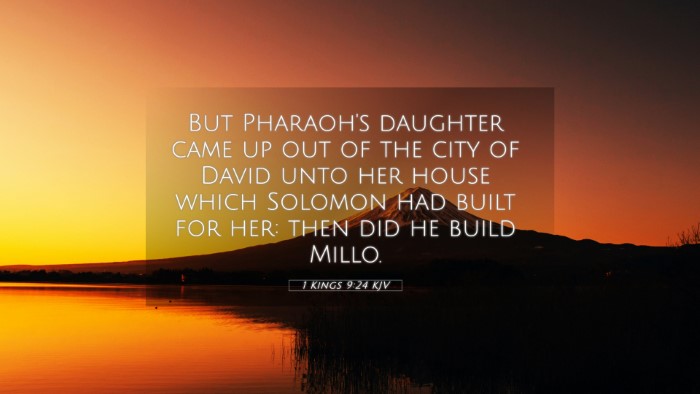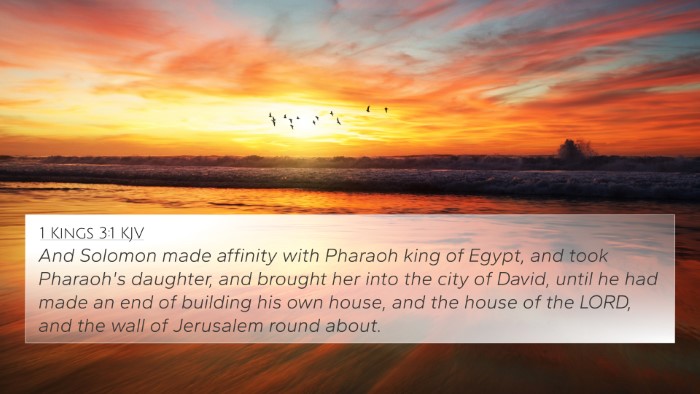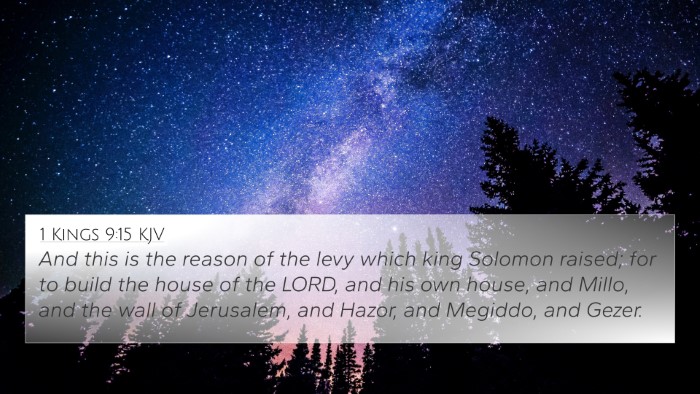Understanding 1 Kings 9:24
1 Kings 9:24 states:
"But Pharoah's daughter came up out of the city of David unto her house which Solomon had built for her: then did he build Millo."
This verse provides insight into the reign of King Solomon, particularly concerning his marriage alliances and architectural endeavors. The mention of Pharaoh's daughter highlights Solomon's political maneuvering, where marriages were often used to secure peace and alliances. Let's explore the meaning of this verse drawing from various public domain commentaries.
Commentary Insights
Matthew Henry's Commentary:
Matthew Henry notes that the marriage with Pharaoh's daughter illustrates not only the grandeur of Solomon’s reign but also his inclination towards idolatry, which stemmed from such alliances. The verse indicates Solomon's dedication to providing for his wife, reflecting his commitment to maintaining political relationships. Moreover, the construction of Millo signifies his efforts to strengthen Jerusalem’s defenses and infrastructure.
Albert Barnes' Notes:
Barnes emphasizes the significance of Pharaoh's daughter in Israelite history, as her presence could bring both political stability and spiritual challenges. He underscores that the building of Millo reinforces Solomon's ambition and his desire to enhance Jerusalem, signifying the prominence of the city in his kingdom. Additionally, the reference to building may imply a connection to fulfilling God's plans for Israel, albeit through complex human relationships.
Adam Clarke's Commentary:
Adam Clarke offers a cultural perspective, noting the importance of Pharaoh's daughter as a foreign influence within Israel. He points out the juxtaposition of this alliance with the eventual spiritual decline it brings. The construction of Millo represents both material successes and foreshadows the eventual consequences of Solomon's choices in maintaining loyalty to God while engaging in foreign practices that may lead to idolatry.
Cross-References
This verse connects meaningfully with several other passages within the Scriptures:
- 1 Kings 3:1: Solomon's marriage alliances with foreign nations.
- 1 Kings 11:1-2: The consequences of marrying foreign wives.
- 2 Chronicles 8:2: Solomon's building projects including Millo.
- Deuteronomy 7:3-4: Warnings against intermarriage with foreign nations.
- 1 Kings 9:15: Solomon's construction achievements and the context of his reign.
- 2 Samuel 5:9: The establishment of David's city, which connects to Millo.
- Matthew 1:5: The mention of Rahab, linking lineage to Solomon through non-Israelite alliances.
Thematic Connections
1 Kings 9:24 reveals several themes relevant to biblical studies:
- Political Alliances: The strategic moves of leaders through marriage.
- Construction and Defense: The importance of building projects in securing a kingdom.
- Spiritual Consequences: The risks associated with foreign influences on faith and practice.
- Divine Providence: Noting how God works through human decisions and their outcomes.
Conclusion
In summarizing the verse, we observe King Solomon's actions, which reflect both the wisdom attributed to him and the complexities of his decisions that ultimately shaped the spiritual trajectory of Israel. The marriage to Pharaoh's daughter and the building of Millo serve as pivotal events that underscore the interplay between human relationships, political strategy, and divine allegiance. Understanding 1 Kings 9:24 through a comparative lens with other Scriptures enhances our grasp of God's overarching plan in the narrative of Israel.
Utilizing cross-referencing study methods can provide deeper insights into the relationships between biblical texts and themes. For those interested in exploring these connections further:
- Engaging with a Bible concordance to identify related verses.
- Utilizing cross-reference Bible study tools to enhance understanding.
- Learning how to find cross-references in the Bible for enriched study.
This approach fosters a richer understanding of the Scriptures, linking themes across different books and highlighting the cohesive narrative of biblical history.









